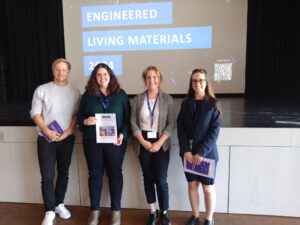Posters
Posters will be displayed on September 18, 18:15 – 19.30.
Each poster will have a DIN-AO panel (width 841 mm x height 1189 mm), and the poster must fit within this area.
Presenters are expected to stand by their posters and answer questions during the poster sessions.
- All presenters will be required to register for the conference and pay the appropriate registration fee.
- Poster prize will be sponsored by WILEY.
Due to the large number of excellent posters this year, we are pleased to announce both a First and Second Place prize. Congratulations to our winners!
🥇 1st Prize is awarded to Hannah Kannenberg & Johann Bauerfeind; University of Art and Design Burg Giebichenstein Halle, DE
Additive Manufacturing of 3D ELMs from Hydrogels with Integrated Nutrient Supply
🏆 2nd Prize goes to Jara Saluena; Vrije Universiteit Brussels, Etterbeek, BE
Shedding Light on the Potential of Mycelium Materials as ELM

from left: Johann Bauerfeind, Hannah Kannenberg, Amanda Mickley-Gass from Wiley & Jara Saluena
#1
Cell cycle regulation within confined colonies of Chlamydomonas Reinhardtii
Sing Teng Chua; University of Cambridge, GB
#2
Growth, Distribution, and Photosynthesis of Chlamydomonas Reinhardtii in 3D Hydrogels
Jeong-Joo Oh; Delft University of Technology, NL
#3
A green wall concept: Micro- and nanoparticles for Enabling Algae growth on concrete
Shaista Ilyas; University of Cologne, DE
#4
In-Silico Engineering of Cyanobacterial Pilins for Living Materials
Robert Tesoriero; Rice University, Houston, US
#5
Project DetoxMicky
Manuel Ibañez & Yvonne Gmach; Technical University Munich, DE
#6
Improved handling and processability of purified E. coli biofilm matrix using Polyvinyl Alcohol
Carolina Sotelo; Max Planck Institute of Colloids and Interfaces, Potsdam, DE
#7
Additive Manufacturing of 3D ELMs from Hydrogels with Integrated Nutrient Supply
Hannah Kannenberg; University of Art and Design Burg Giebichenstein Halle, DE
#8
Towards designing anionic hydrogels for enhanced biocontainment
Henrique Sepulveda Del Rio Hamacek; Tallinn University of Technology, EE
#9
Low-Cost, High-Resolution 3D-Printing of Microfluidics for Self-Sustained Hydration of Engineered Living Materials
Aileen Sun; University of Washington, Seattle, US
#10
The potential of exopolysaccharides in sustainable additive manufacturing
Katharina Ostertag; University of Natural Resources and Life Sciences (BOKU), Vienna, AT
#11
Fibres as tailored substrates for scalable Engineered Living Material
Cindy Elschner; Leibniz-Institut für Polymerforschung Dresden e. V., DE
#12
Application of Fungal-based Biomaterial in Construction Industry
Lisa Stelzer; Technische Universität Berlin, DE
#13
Dirty’ ELMs – Fabrication of a responsive large-scale material in non-sterile environments
Aileen Hoenerloh; Northumbria University, Newcastle Upon Tyne, GB
#14
3D Bioprinting of Engineered Living Materials with Extracellular Electron Transfer Capability
Xiaoli Liu; Technische Universität Dresden, DE
#15
Bacterial cellulose: how multiple harvests promote productivity and influence materials properties
Cécile Bidan; Max Planck Institute of Colloids and Interfaces, Potsdam, DE
#16
Redefining 3D Bioprinting, Vertical Bio-Ink Deposition for Improved Biofabrication
Richard W. van Nieuwenhoven; Technische Universität Wien, AT
#17
Pulling bacterial fibers out of self-assembling protein-bacteria water-air interfacial films
Rafael Moreno Tortolero; University of Bristol, GB
#18
4D Green Bioprinting: plant-based living biohybrid materials
Erica Colaprico; Linköping University, SE
#19
A new platform for robust engineered living materials: Engineered S-layer protein of the polyextremophile Deinococcus radiodurans
Ha Chau Nguyen; Rice University, Houston, US
#20
Shaping nematic order in bacterial films with single-cell resolution patterning
Matthias Le Bec; ETH Zurich, CH
#21
Investigating the tunability of de novo living materials’ structure and rheological properties
Esther Jimenez; Rice University, Houston, US
#22
Shedding light on the potential of mycelium materials as ELM
Jara Saluena; Vrije Universiteit Brussels, BE
#23
Electrospun bacterial cellulose: An engineered living material for the future
Subhadeep Paul; Northumbria University, Newcastle upon Tyne, GB
#24
Growth, Manipulation, and Characterization of Bacterial Polysaccharides
Meredith Silberstein; Cornell University, Ithaca, US
#25
E. coli mixtures reveal the role of curli and cellulose fiber ratio and interactions in soft-composite matrix
Macarena Siri; Max Planck Institute of Colloids and Interfaces, Potsdam, DE
#26
Programming and Fabrication of a Novel Hygromorphic Engineered Living Material for Architecture
Emily Birch; Northumbria University, Newcastle upon Tyne, GB
#27
Shedding light on the potential of mycelium materials as ELM
Jara Saluena; Vrije Universiteit Brussels, BE
#28
3D Printing Living Building Materials for Low-Embodied Carbon: Strengthening Bonds Through Microbial Biocement
Karen Andrea Antorveza Paez; ETH Zurich, CH
#29
3D Printing of Living Bioluminescent Mechanosensors
Mathias Steinacher; ETH Zurich, CH
#30
Automated Bioprinting of Core-Shell ELM fibers: Standardization for Therapeutic Applications
Mokhamad Khamdan; INM – Leibniz Institute for New Materials, Saarbrücken, DE
#31
Microfluidic fabrication of Pluronic Living Biofactories
Hanuman Kalari; INM – Leibniz Institute for New Materials, Saarbrücken, DE
#32
Innovative Applications of Tree-Fungal Symbiosis in Engineered Living Materials
Andrew Gennett; Biologic Black Box [B³] Studios, Berlin, DE
#33
Bioremediation and upcycling of textile fibers using fungal-bacterial co-cultivation
Annah-Ololade Sangosanya; Vrije Universiteit Brussels, BE
#34
Mixed-species phototrophic microbial consortia in porous scaffolds to produce value-added products
Tilo Pompe; Leipzig University, Leibniz Institute of Surface Modification, DE
#35
Advancing Engineered Living Materials: Integrating filamentous fungi and bacteria for fully biological and functional living materials
Hannelore Wilssens; Ghent University, BE
#36
Photosynthetic living materials with cyanobacteria-bacillus subtilis consortia
Yifan Cui, ETH Zurich; CH
#37
Engineering K. rhaeticus for self-pigmentation and enhanced adhesion in bacterial cellulose materials
Ivy Li; Imperial College London, GB
#38
SporoBeads: using the inner and outer coat of Bacillus subtilis endospores as a protein displaying platform
Lennart Scheufler; Technische Universität Dresden, DE
#39
Synthesis and Formation of Bacterial Biofilm-Inspired Matrix
Jhih-Yi Huang; Max Planck Institute of Colloids and Interfaces, Potsdam, DE
#40
3D Printed Hybrid Materials as Novel Light-living Biosensors
Giulia Brachi; University of Colorado Boulder, US
#41
Self-Remediating Fungal Materials: Advancing Sustainable Dye Wastewater Treatment
Anouk Verstuyft; Vrije Universiteit Brussel, BE
#42
Self-patterning engineered living materials based on E. coli curli nanofibers
Roberto Avendano; University of Lausanne, CH
#43
Effect of (in)organic additives on microbially induced calcium carbonate precipitation
Jamie Haystead; Northumbria University, Newcastle Upon Tyne, GB
#44
Genetically Programmed Engineered Living Materials as High-Performance Bioplastics
Kinsey Drake; University of Washington, Seattle, US
#45
Genetically Engineered Viruses as Bioremediation Agents for a Circular Economy
Nuriye Korkmaz Zirpel; KIST Europe, Saarbrücken, DE
#46
Optogenetic control of extracellular signal gradients and cell-fate in gel-embedded binary yeast populations
Alvaro Banderas; Institut Curie, Paris, FR
#47
Modification of Fomes fomentarius cell wall properties for the removal of beta lactam antibiotics from wastewater streams
Stephan Starke; Technical University of Berlin, DE
#48
A Mobile Magnetic Bioassay Approach for Pathogen Detection and Antibiotic Resistance Containment
Matthias Grundmann; Fraunhofer-Institut für Molekularbiologie und Angewandte Oekologie IME, Aachen, DE
#49
Construction of Programmable Microbial Living Functional Materials Based on fungal mycelium
Ke Li; Shenzhen Institute of Advanced Technology, CN
#50
Cyanobacteria can form calcium carbonate coatings on glass fibers, used for fiber-reinforcement of concrete
Michael Gelinsky; Technische Universität Dresden, DE
#51
Bacterial Hybrid Light-emitting Diodes
Stephanie Grümbel; Technische Universität München, DE
#52
Engineered Living Energy Materials
Xinyu Wang; Shenzhen Institute of Advanced Technology, Chinese Academy of Sciences, CN
#53
Engineered Bacillus subtilis based system for mechano-sensing and structural remodelling in living materials.
Martyn Dade-Robertson; Northumbria University, Newcastle upon Tyne, GB
#54
Ethical and social aspects of ELMs in the food sector – the example of cultured meat
Martina Baumann; Radboud University, NL
#55
Environment Aware Memristive Oscillatory Circuit towards ELM Emulation
Ioannis Tompris; Democritus University of Thrace, Xanthi, GR
#56
Regenerative potential of fungi in Engineered Living Materials
Elise Elsacker; Vrije Universiteit Brussel, BE
#57
Thermally Responsive Hydrogel Waveguides for Remote Activation of Living Materials
Zahra Kafrashian; INM – Leibniz Institute for New Materials, Saarbrücken, DE
#58
Engineering Thermo-Responsive Probiotic Bacteria For Developing Disease-Responsive Living Therapeutic Materials
Anwesha Chatterjee; INM – Leibniz Institute for New Materials, Saarbrücken, DE
#59
Biocompatibility assessment of a Pluronic-based engineered living material
Joelle Mekontso Ngaffo; INM – Leibniz Institute for New Materials, Saarbrücken, DE
#60
Living viscoelastic biomaterials for regenerative medicine
Graham Day; University of Glasgow, GB
#61
Towards living therapeutics in ophthalmology: Supply of the cell protectant ectoine using engineered Corynebacterium glutamicum
Berina Muhovic; Institute of Systems Biotechnology, Saarland University, Saarbrücken, DE
#62
Evaluation of small anti-inflammatory therapeutic peptides secreted by living therapeutic materials (LTMs)
Ketaki Deshpande; INM – Leibniz Institute for New Materials, Saarbrücken, DE
#63
Genetically Engineered Bacteria in Silk Fibroin Hydrogels: A Novel Therapeutic Approach for Age-Related Macular Degeneration
Amias Moore; The University of Northumbria, Newcastle upon Tyne, GB
#64
A screening setup to streamline in vitro Living Therapeutic Material cultures with the host
Krupansh Desai; INM – Leibniz Institute for New Materials, Saarbrücken, DE
#65
Engineered Living Material with antioxidant activity for topical applications
Laura Sabio; University of Glasgow, GB
#66
Phagocytic synthetic cells: non-living predators to fight bacteria
Elias al Tawil; Institute for Bioengineering of Catalonia and Catalan Institution for Research and Advanced Studies, Barcelona, ES
#67
Genetically Engineered Bacteria in Silk Fibroin Hydrogels: A Novel Therapeutic Approach for Age-Related Macular Degeneration
Amias Moore; The University of Northumbria, Newcastle upon Tyne, GB
#68
Proof-of-concept of implantable Engineered Living Materials (ELM) for in situ drug administration, built with genetically engineered bacteria (GEB) and silk hydrogels
Nahla Jemni-Damer, Silk Biomed, Polytechnic University of Madrid, Complutense University of Madrid, ES
#69
Living Therapeutic Meshes
Lara Luana Teruel Enrico; INM Leibniz Institute for New Materials, Saarbrücken, DE
#70
Exploring Living Organisms for Wood Based Products
Robert Kindler; ETH Zürich, CH
#71
Bacteria-driven Precipitation of Calcium Carbonate in Droplets
Nadia Enrriquez Casimiro; ETH Zurich, CH
#72
Confined Escherichia coli cells: Mechanical strain sensing and shape recovery
Lars Renner; Leibniz Institut für Polymerforschung Dresden, DE
#73
High-Throughput Droplet Microfluidic Screening of Ureolytic Bacteria
Diegop Giovanoli; ETH Zürich, CH
#74
Self-healing biomineralized bacterial cellulose composite
Likhitha Reddy Kummetha; Delft University of Technology, NL
#75
ELM Microarray Systems: High Throughput Assessment of Bacteria in Confinement
Ann-Cathrin Schlapp; INM – Leibniz Institute for New Materials, Saarbrücken, DE



